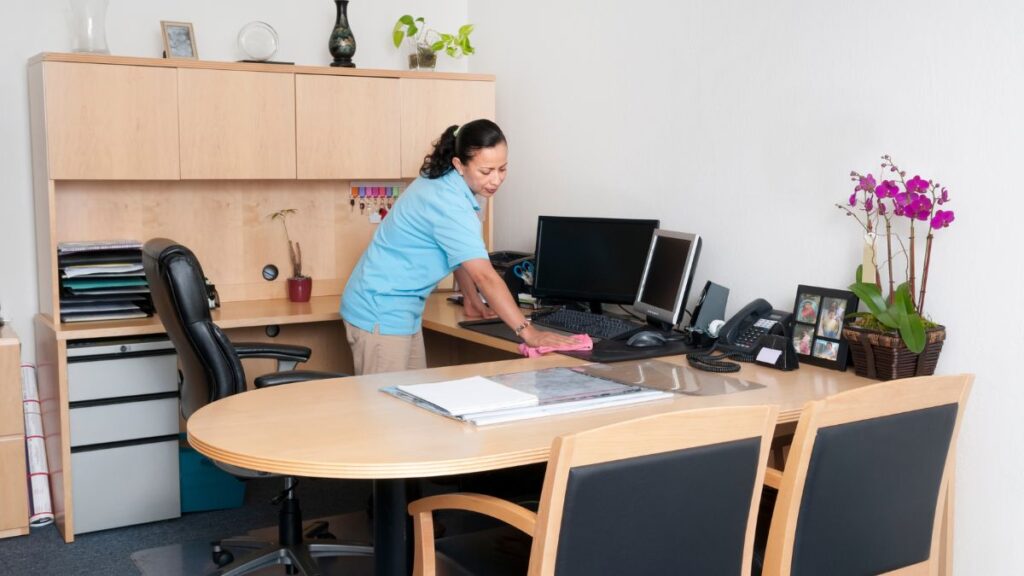Want to be your own boss? Tired of the 9-to-5 grind? Starting a cleaning business in Kenya could be your ticket to freedom and financial independence.
It’s a high-demand, low-cost business with the potential for serious growth.
This isn’t some get-rich-quick scheme. This is about building a real, profitable business.
Ready to get your hands dirty (in a good way)?
Read also: Is a Cleaning Business Profitable in Kenya?
How to Start a Small Cleaning Business in Kenya
If you want to start a successful cleaning business in Kenya, follow these exact steps.
Of course, you don’t have to follow every step… they are here to inspire you.
1. Find Your Cleaning Niche (and Dominate It)
Don’t try to be everything to everyone.
Pick a specific cleaning niche and become the go-to expert.
This helps you:
- Target your marketing: Know exactly who your ideal customer is and where to find them.
- Develop specialized skills: Become incredibly efficient and effective in your chosen area.
- Command higher prices: Expertise equals value, and value equals higher profits.
Here are a few profitable niches to consider:
- Residential cleaning: Apartments, houses, post-construction cleaning.
- Commercial cleaning: Offices, shops, schools.
- Specialized cleaning: Carpet cleaning, window cleaning, upholstery cleaning.
What you should do:
- Research your local market: What cleaning services are in high demand? What are the gaps you can fill?
- Consider your skills and interests: What type of cleaning do you enjoy? Where do you excel?
- Start narrow, then expand: Master one niche before adding more services.
2. Get Essential Equipment for Your Cleaning Arsenal
You can’t fight a war without weapons.
In the cleaning business in Kenya, your equipment is your arsenal.
Invest in high-quality tools that will last and make you more efficient.
Must-have cleaning equipment:
- Cleaning solutions: All-purpose cleaners, disinfectants, glass cleaners, floor cleaners.
- Microfiber cloths: These are your cleaning workhorses. Get different colors for different surfaces.
- Mops and buckets: A good mop and bucket system is essential for floor cleaning.
- Vacuum cleaner: Invest in a powerful vacuum with different attachments.
- Brushes and scrubbers: For tackling tough grime and stains.
- Protective gear: Gloves, masks, and aprons to keep you safe and clean.
What you should do:
- Don’t skimp on quality: Cheap equipment breaks easily and doesn’t do a good job.
- Buy in bulk: Save money by purchasing cleaning supplies in bulk.
- Keep it organized: A well-organized cleaning kit saves you time and frustration.
Top Tools:
- Kärcher pressure washer: For heavy-duty cleaning tasks.
- Bissell SpotClean Pro: A portable carpet cleaner for tackling tough stains.
| Equipment | Description | Price Range (KES) |
|---|---|---|
| Vacuum Cleaner | For general cleaning of carpets and floors | 10,000 – 50,000 |
| Wet & Dry Vacuum Cleaner | Versatile for both liquid and solid waste | 15,000 – 60,000 |
| Pressure Washer | For outdoor cleaning and tough stains | 20,000 – 80,000 |
| Floor Scrubber | Automated cleaning for hard floors | 30,000 – 150,000 |
| Steam Cleaner | For deep cleaning and sanitizing surfaces | 12,000 – 40,000 |
| Carpet Cleaner | Specialized for cleaning carpets | 25,000 – 70,000 |
| Mops and Buckets | Basic tools for wet cleaning | 1,500 – 5,000 |
| Brooms and Brushes | For sweeping and scrubbing surfaces | 500 – 3,000 |
| Cleaning Chemicals | Detergents, disinfectants, and specialized cleaners | 2,000 – 10,000 |
| Personal Protective Equipment | Gloves, masks, and uniforms | 1,500 – 5,000 |
3. Price It Right: How to Charge for Your Cleaning Services in Kenya
Pricing is a balancing act.
You need to be competitive to attract customers, but also profitable to stay in business.
Here are a few pricing strategies:
- Hourly rate: Charge an hourly rate based on your experience and the complexity of the job.
- Per-job pricing: Set a fixed price for specific cleaning tasks (e.g., cleaning a one-bedroom apartment).
- Square footage pricing: Charge based on the size of the area to be cleaned.
What you should do:
- Research your competitors: What are other cleaning businesses charging in Kenya?
- Factor in your costs: Include the cost of supplies, equipment, and your time.
- Offer packages and discounts: Attract more customers with bundled services and discounts for recurring cleaning.
Pro Tip: Don’t undervalue your services! You’re providing a valuable service that saves people time and effort.
4. Market Your Cleaning Business Like a Pro
No matter how good you are, you won’t get clients if they don’t know you exist.
You need a solid marketing strategy to get the word out.
Here’s how to market your cleaning business:
- Word-of-mouth: Tell everyone you know about your business. Offer referral bonuses to existing clients.
- Online presence: Create a website and social media profiles. Use local SEO to rank higher in search results.
- Flyers and brochures: Distribute flyers and brochures in your local area.
- Local partnerships: Partner with property managers, real estate agents, and other businesses.
- Online advertising: Run targeted ads on Google, Facebook, and other platforms.
What you should do:
- Focus on your unique selling proposition: What makes your cleaning business different?
- Offer free consultations and quotes: Build trust and demonstrate your expertise.
- Collect customer testimonials: Positive reviews are powerful marketing tools.
Top Tools:
- Google My Business: A free tool to manage your online presence.
- Canva: Create professional-looking marketing materials.
5. Deliver an Outstanding Customer Experience
In the cleaning business in Kenya, customer service is king.
Exceed your clients’ expectations and they’ll become loyal customers (and raving fans).
Here’s how to wow your clients:
- Be punctual and reliable: Show up on time and do what you say you’ll do.
- Pay attention to detail: Go the extra mile to ensure a spotless clean.
- Communicate effectively: Keep your clients informed and address any concerns promptly.
- Be friendly and professional: Build rapport with your clients and make them feel valued.
What you should do:
- Ask for feedback: Find out what your clients think of your service and how you can improve.
- Offer guarantees: Stand behind your work with a satisfaction guarantee.
- Go above and beyond: Surprise your clients with small gestures of appreciation.
Remember: Happy clients are your best marketing asset. They’ll refer you to their friends and family, and your business will grow organically.
6. Level Up Your Cleaning Business in Kenya
You’ve launched your cleaning business. You’re getting clients. Now it’s time to scale and grow.
Here are some strategies to take your business to the next level:
- Hire and train a team: Expand your capacity and take on more clients.
- Invest in advanced equipment: Improve efficiency and offer more specialized services.
- Develop systems and processes: Streamline your operations and ensure consistent quality.
- Expand your service area: Target new neighborhoods and markets.
- Diversify your services: Offer additional cleaning services or related services like organizing.
What you should do:
- Delegate tasks: Don’t try to do everything yourself. Focus on your strengths and delegate the rest.
- Invest in your team: Provide training and opportunities for growth.
- Track your finances: Monitor your income and expenses to ensure profitability.
Top Tools:
- Quickbooks: Accounting software to manage your finances.
- Asana: Project management tool to keep your team organized.
Here’s A Checklist To Use To Start a Cleaning Business in Kenya
This checklist is your roadmap to success. Follow it closely and you’ll be well on your way to cleaning up (literally and financially).
Phase 1: Laying the Foundation
- [ ] Niche Down:
- Identify your ideal customer (residential, commercial, specialized).
- Research your local market and competition.
- Determine your service offerings (what sets you apart?).
- [ ] Legalize It:
- Register your business name and obtain necessary licenses.
- Understand tax requirements and obligations.
- Consider business insurance to protect yourself and your assets.
- [ ] Gear Up:
- Create a detailed inventory of essential cleaning supplies and equipment.
- Prioritize quality over cost – cheap tools break easily.
- Invest in a reliable vehicle for transportation (if needed).
- [ ] Price It Right:
- Research competitor pricing in your area.
- Calculate your costs (supplies, labor, overhead).
- Develop a clear pricing structure (hourly, per job, square footage).
Phase 2: Building Your Brand
- [ ] Craft Your Message:
- Develop a unique selling proposition (USP) – what makes you different?
- Create a compelling brand name and logo.
- Design professional marketing materials (flyers, brochures, website).
- [ ] Establish Your Online Presence:
- Build a simple website showcasing your services and contact information.
- Create social media profiles on relevant platforms.
- Claim your Google My Business listing.
- [ ] Spread the Word:
- Network with potential clients and referral sources.
- Leverage online and offline marketing channels (flyers, social media ads).
- Offer introductory discounts or promotions to attract initial customers.
Phase 3: Delivering Excellence
- [ ] Systematize Your Process:
- Develop standardized cleaning procedures for consistency.
- Create checklists to ensure no detail is overlooked.
- Invest in scheduling and communication tools.
- [ ] Customer Obsession:
- Prioritize punctuality, professionalism, and communication.
- Go the extra mile to exceed customer expectations.
- Actively seek and respond to customer feedback.
- [ ] Build Your Team (If Scaling):
- Develop a hiring process and criteria.
- Invest in training to ensure consistent quality.
- Foster a positive and motivating work environment.
Phase 4: Scaling Your Empire
- [ ] Optimize and Analyze:
- Track key performance indicators (KPIs) like customer acquisition cost and client retention.
- Analyze data to identify areas for improvement and growth.
- Refine your processes and strategies based on insights.
- [ ] Expand Your Offerings:
- Introduce new cleaning services or packages.
- Explore related service areas like organizing or handyman services.
- Consider partnerships or collaborations to broaden your reach.
- [ ] Invest in Technology:
- Utilize scheduling and CRM software to manage clients and appointments.
- Explore online booking and payment options for convenience.
- Stay informed about industry trends and innovations.
This checklist is your battle plan. Execute it flawlessly, and you’ll be well on your way to conquering the cleaning world.
Final Thoughts
Starting a cleaning business in Kenya is a smart move. It’s a growing industry with low barriers to entry and high potential for profit. But it takes more than just a mop and bucket to succeed.
You need a plan, a strategy, and the right mindset. You need to be focused, disciplined, and customer-centric. And you need to be willing to hustle and put in the work.
Follow the steps in this guide and you’ll be well on your way to building a thriving cleaning business.
Read also:


